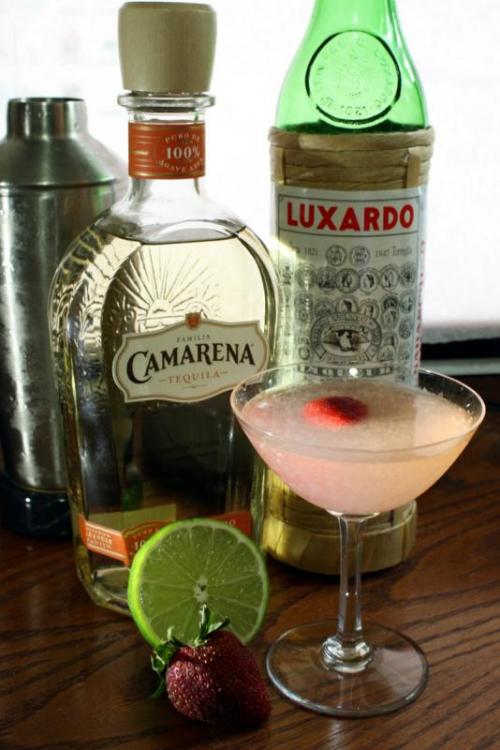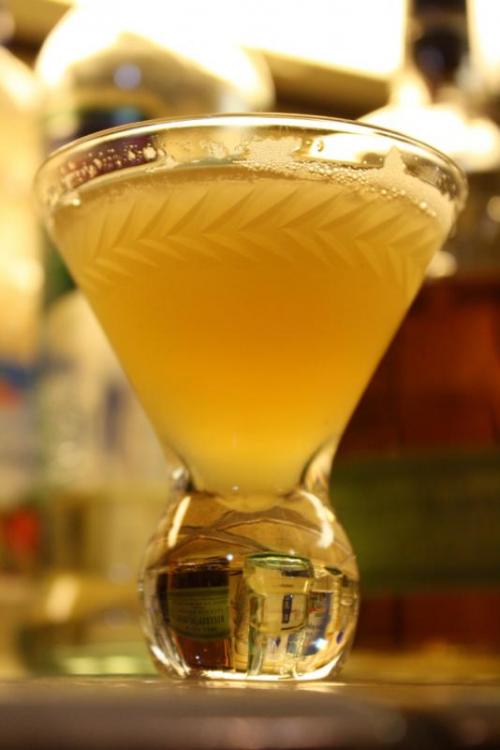-
Posts
617 -
Joined
-
Last visited
Profile Information
-
Location
Minnesota
Recent Profile Visitors
3,326 profile views
-
Over at the Eat Your Books website, Jenny Hartin of The Cookbook Junkies posts a weekly Kindle sale update. The most recent one is here.
-
Raspberry preserves. I used a strawberry corer to get round dollops.
-
I made the "Corked" Breton Galettes. They are salty/sweet, chewy with a bit of crunch, and their flavor was impressive for such a simple recipe. I couldn't stop at just one. I'm making desserts for a fall wedding and these will definitely make the cut.
-
Haven't checked into eG recently - glad to see this thread was still active! I (almost) made a Conquistador tonight - it's an egg white drink and I didn't want to bother with it so I didn't use it. Tequila, aged rum, lemon juice, lime juice, simple, house orange bitters (1/2 Regans 1/2 Fees). I used a resposado tequila instead of blanco, but even with that substitution it was damn tasty. Surprisingly vegetal (in a good way). FrogPrincesse - I saw your comment on the drink in EYB which is why I tried it. I hope you are still posting comments there - I value your opinion!
-
Like many others who have posted their condolences, I haven't been on eG much recently, but I owe a debt to Steven and the entire eG community. This place was among the first where I felt a sense of community online; I met so many good friends and learned so much. My sympathies go out to Steven's family and friends.
-
Bumping this thread up to hear what people have to say about 10 Cane seven (?!) years on. It only recently showed up on my liquor store shelves (or I only recently noticed it), and it's become my go-to rum for cocktails, since it frequently goes on sale for under $20 and it plays nicely with a variety of mixers. As an aside, the first time I posted a photo of the bottle, one of my friends thought it said Iocane - now all the new cocktails I make from it get Princess Bride names.
-
Since it was on sale for 1/2 price, I just picked up a bottle of Marie Brizard brown creme de cacao. Other than coloring, is it different than the white? The description on their website is exactly the same for both, but I'd like to know if the flavors are different. I'd be willing to forsake the aesthetics to try a cocktail that calls for the white, like the 20th Century, provided the flavor profile is the same.
-
Posting in this forum makes me feel like the dog meme, but I'm forging ahead anyway. I really haven't done anything with tequila except for margaritas, but thought I would venture out. Given the affinity of maraschino and tequila mentioned above I muddled a strawberry, added 1 1/2 oz reposado tequila, 3/4 oz Luxardo maraschino, juice of 1/2 a lime (~3/4 oz) and 1/4 oz of simple and came up with this: Maybe needs less acid, but I thought the flavors melded nicely.
-
I use ruby and I don't find it too sour at all. This is probably my favorite rum drink so far.
-
As someone who was raised in North Dakota to German descendents (my mom didn't speak English until she went to school), let me be the first to congratulate you on your knoephla discovery. Knoephla is the term for the dumplings, so if you didn't have dumplings in the broth you just had potato soup. For my family, key to the knoephla soup experience is the addition of celery leaves to the soup along chopped celery and onion. We didn't use carrots, but I see no reason not to use them. Second, when simmering the soup to cook the potatoes, add several whole allspice and a couple of bay leaves. Germans don't leave home without those two ingredients. Also a tradition in my family is the use of Watkins chicken base, but a good homemade stock obviates the need for that much salt and MSG. As for the dumplings, my grandmother's recipe results in great dumplings, but only on the second day (they need an overnight rest in the broth to properly plump). I'm printing my grandmother's knoephla soup recipe below, but I've recently discovered a way to get lighter, fluffier dumplings right off the bat. The recipe is called schwemmkloesse, and it's basically pate a choux with a small twist. You separate the eggs and add the yolks to the flour/water/butter mixture, then beat the egg whites to soft peaks and fold them in. This batter is then piped right into the simmering soup for light as air dumplings. If you use the schwemmkloesse dumplings, you'll need to reduce the amount of liquid in the soup. But without further ado, here is the recipe for Knoephla Soup from my grandmother, Bertha Schwind (with a name like that you know it's authentic). It seems like a lot of broth but the emphasis is on the dumplings, which will eventually soak up most of the liquid. You'll be left with a thick soup. It's much better the second day if you use the traditional dumpling recipe. For soup: 1/4 cup chopped celery w/some leaves 1 large onion, finely diced 2 tablespoons butter 2 large russet or red potatoes, small dice or grated 1 quart water and 1/4 cup chicken base (or 1 quart quality chicken stock) 1 quart milk Bay leaves & allspice to taste Salt & pepper to taste 1/4 cup butter or heavy cream For knoephla: 2 cups flour 1/4 cup oil 3 eggs 1/2 teaspoon salt Milk to form stiff dough Saute celery and onion in butter. Add potatoes, water with chicken base (or chicken broth), and milk. Season with salt and pepper to taste. Add bay leaves and allspice. Simmer until potatoes are nearly tender. While potatoes are simmering, combine flour, oil eggs, salt and enough milk to make a stiff dough. Cut this dough into boiling water with 2 Tbsp. oil in it. Cook until all dumplings float. Add drained dumplings to soup broth. Finish with butter or heavy cream.
-
Got this book and David Wondrich's Imbibe last week and have been enjoying both of them immensely. I've already made a Bee's Knees, Jack Rose (from Imbibe), and the latest was the Algonquin (Rittenhouse Bonded Rye, Dolin Dry Vermouth and pineapple juice). I had to substitute Bulleit Rye and Noilly Prat. I'm definitely going to need to visit the liquor store soon with a fistful of dollars.
-

The truth about plastic containers, bottles, and packaging
Darcie B replied to a topic in Kitchen Consumer
To clarify, I do not mean that just because someone stands to profit from a particular result that any study achieving that result must be invalid. Knowing who is funding the research can bring perspective to underlying assumptions that were made, etc., especially in a non peer-reviewed study. I am a natural skeptic, and I want to know the motives behind any claims that are made. -

The truth about plastic containers, bottles, and packaging
Darcie B replied to a topic in Kitchen Consumer
These kind of blanket assumptions are incendiary and a hindrance to rational discussion. Heck, maybe corporations are just better at keeping secrets. I find it is farfetched to argue that scientists in the CDC, NIH, etc. are all in cahoots to pull the wool over the public's eyes with regard to health risks of products and chemicals. Not to say there is never a flaw in their research, but by your "logic" the government made up evidence about the health risks of tobacco, for example. I think not. Follow the money is my mantra. Who funds the science and stands to profit or lose due to a particular finding? Yeah, I trust the government more than corporations. Having worked both in the public and private sectors I feel I have made a rational decision to do so. -
For me the question is not "is this organic piece of fruit better for me than this conventional piece of fruit?", it is whether the consequences of conventional (and really, it's only been conventional for less than 100 years) farming are better or worse than alternatives including organic and IPM (integrated pest management). I think solid science indicates that there are sometimes negative consequences of our use of petrochemicals. We have dead areas in the Gulf of Mexico likely due to agricultural runoff. Soil fertility has declined, and with it the ability of many soils to hold water. Et cetera. I grew up in small grain farming country (North Dakota), and back in the day, great yield improvements occurred due to several factors. Hybridization introduced more productive plants and herbicides, pesticides and fertilizers were inexpensive to produce and use. Larger equipment allowed crops to be planted and harvested more economically. Many, if not most, farmers were of the 'more is better' mentality and dumped shitpiles of petrochemicals onto the crops because they worked and the cost was relatively low. My grandparents had a 2,000-acre farm and I know they didn't think twice about the use of any of the above-referenced products. They needed to increase yield because prices were flat or declining. And that is how the system worked for a long time - scientific and equipment enhancements greatly increased yields, which kept prices down, which meant you needed more yield to make a profit. It is a vicious cycle. However, the curve for yield enhancements is purt' near flat now, and without significant use of petrochemcials you cannot get enough yield to make a profit. I know this because my brothers purchased the farm and are now running it. They actually got the land certified organic a few years ago and liked not having to apply the chemicals, but alas they could not make it work. The yields were much lower due to substantial weed and pest infestation (intensive monoculture cropping doesn't really work organically). Also, the local grain elevators would not pay the premium for organic crops because they did not have separate storage facilities. Therefore any profit was eaten up by transportation costs. I think I had a point in here somewhere. Oh, we've reached the point of diminishing returns on our petrochemical investments. Throw in anticipated climate change consequences (water resources issues, changing frost dates to which some pests and weeds adapt better, more frequent severe weather phenomena), and you have an unpredictable future for industrial farming. Which is why I choose to buy as many products raised in what I believe to be a more sustainable manner. Sometimes that includes organic products, sometimes local, and eating less meat. My family grows some of its own food (my mom and brother have a kick ass garden). Is my consumption going to make much difference? Probably not, but I would rather not contribute to the problem. The issue of feeding a growing population is related, but is even more complex. Finally, I believe it is likely that many heirloom varieties are better for us than hybrids which are bred for things other than nutrition. But I also think we have better nutrition than our forebears because we have an abundance and greater variety of available foodstuffs.
-
I've never eaten with anyone that slow, but we have some friends who dawdle. I don't mind; it allows more time to drink wine. What I don't care for is people like my sister-in-law, who eats like a prisoner: arm wrapped around her plate (to defend her food?), holding her fork like a club, shoveling in the food head down. [shudder]






